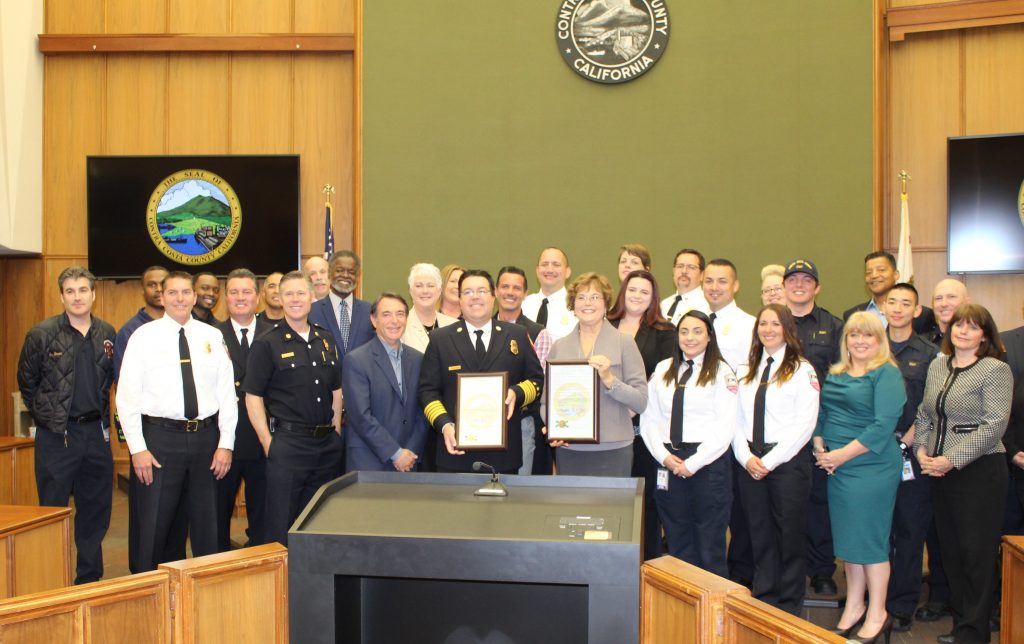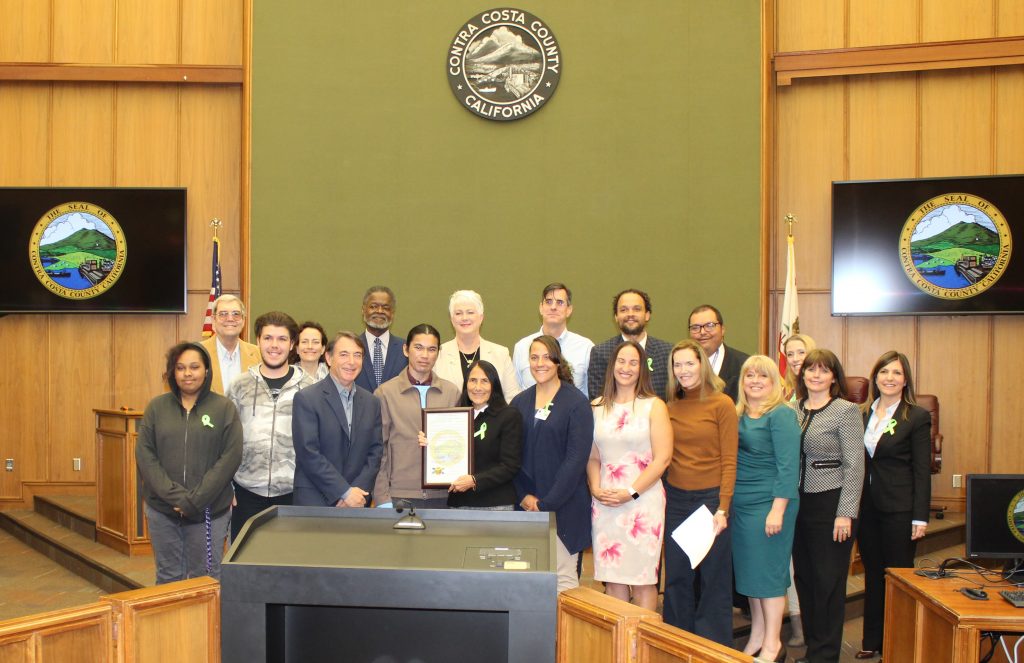
The Contra Costa County Board of Supervisors recognized National Emergency Medical Service Week, May 19 through 25, by handing out resolution to Contra Costa County Fire Chief Lewis Broschard and EMS Director Pat Frost on Tuesday. The supervisors’ resolution recognizes the vital work of responders including medical technicians, paramedics, police, firefighters, emergency nurses, emergency physicians, emergency medical dispatchers, EMS educators, and EMS administrators for the roles they play in the EMS system. Photo by Daniel Borsuk.
Exclude Blackhawk, Bollinger Canyon from commercial cannabis ordinance; prevent rail service from returning to line through Richmond park
By Daniel Borsuk
The possibility Contra Costa County residents might be voting on a sales tax measure, perhaps in the November 2020 general election, gained traction Tuesday when Supervisor Karen Mitchoff convinced supervisors to have the Finance Committee study the feasibility of placing a tax measure before the voters, next year.
Supervisors voted 5-0 to assign the Finance Committee to examine the pros and cons of putting a sales tax proposition on the November 2020 ballot while also considering another agenda item — the pros and cons of placing a half-cent sales tax ballot measure to fund transportation projects laid out in the Contra Costa Transportation Authority’s Transportation Expenditure Plan.
As it turned out, supervisors rejected the idea of pushing ahead on a new transit tax proposition, thinking the timing might be off-track. Mitchoff reasoned another half-cent sales tax for transportation projects might not draw the necessary two-thirds majority voter approval particularly when voters remember passing the half-cent Measure J by a 71 percent voter approval in 2004. Measure J’s $2.5 billion will not be exhausted until 2034.
“I don’t believe our taxpayers will support a transit tax measure requiring a two-thirds voter approval” Mitchoff said. “We need to have a conversation on a countywide general sales tax.”
The supervisor from Pleasant Hill thinks a county sales tax that needs a 50 percent voter approval might be a better route to go, even though the revenue would have to be disbursed to diverse services like medical, social services, public defender, sheriff, public works, district attorney and other county services.
“You should focus on other services,” said Justin Decker of the International Federation of Professional Technical Engineers Local 21. “We’re against the transit proposal.”
County eligibility worker Kathy Beverly said the county is seriously understaffed with eligibility workers at 170 unfilled positions.
“County workers oppose a transit sales tax proposal,” she said.
SEIU Field Representative Ye Do cautioned supervisors that placing a transit tax on the ballot could backfire when there is a need to financially address social services. She cited how a single father of three children needed county assistance when he had to move three time under hardship conditions.
San Mateo, Santa Clara, and Alameda counties assess sales taxes in order to generate additional revenues to fill in funding gaps that property tax and state and federal resources fall short on funding county services, especially social and medical services. Alameda county draws $150 million in annual revenue from its sales tax.
“It’s very clear we need a sales tax for transportation, “said District 5 Supervisor Federal Glover of Pittsburg, who also serves as the county representative on the Metropolitan Transportation Commission. “It’s a quality of life issue. It may not be optional. Just to get to work, to go home. These services are so crucial. I don’t know if we have any other bargaining chips.”
“This is a helpful issue,” said Vice Chair Candace Andersen of Danville. “What we need are more park and ride lots.”
Board Chair John Gioia, who has at previous board meetings promoted the county sales tax concept, remarked because of passage of Measure J, “Things have changed. When one sales tax measure for transportation passes, it makes the next sale tax measure much harder to pass.”

The Contra Costa County Board of Supervisors presented a resolution to Contra Costa County Director of Health Services Anna Roth recognizing May as Menth Health Month. During the month of May, county agencies have made a commitment to raise awareness and public education to replace misinformation and eliminate stigma concerning mental health and promote understanding that people living with mental health challenges can lead to productive lives. Photo by Daniel Borsuk.
Supervisors Exclude Blackhawk, Bollinger Canyon from Commercial Cannabis Ordinance
In other action, supervisors voted 5-0 to add Blackhawk and Bollinger Canyon to the list of areas to be excluded from the county’s commercial cannabis ordinance. The ordinance had prohibited commercial activities in Alamo, Bethel Island, Contra Costa Centre, Sandmound Slough, and Saranap.
Dan Clancy, owner of the Bollinger Canyon property that he had planned for cannabis cultivation and distribution purposes, pleaded with supervisors “give us a shot.”
But the site, which was a former Nike missile site, apparently fell through the cracks during the planning process, according to Ruben Hernandez of the Department of Conservation and Development and was meant to be excluded for any type of cannabis activity.
Supervisor Andersen, who represents the Bollinger Canyon area, said the Bollinger Canyon site was “a clerical error” during the planning review process.
Blackhawk Police Tax Election Set for August 28
Supervisors voted 5-0 to authorize an August 28 election in the County Service Area P-2 Zone A Blackhawk area even though there was opposition from the Blackhawk Country Club that did not want to be included in the police assessment district for the first time in the 35-year history of the police zone. The country club claims it does not need the police services provided by the county sheriff’s department because of the low crime activity emanating from the club. There have been two calls for police services in the past year.
The Blackhawk Police Department consists of one lieutenant and three deputies provided by the county Sheriff-Coroner’s Office, but according to Ron Banducci, chairman of the Blackhawk Police Advisory Committee and president of the Blackhawk Homeowners Association, unless voters pass the August tax measure the police department will have to cut one of the deputy positions.
“Although physically within the district, the Blackhawk Country Club has not historically been included in the parcel tax structure” Banducci told supervisors. “This means that for 35 years, the country club has been receiving services from the Blackhawk police, but has not provided financial support. The Blackhawk Police Advisory Committee believes it’s time for the country club to pay its fair share. The Blackhawk County Club is the largest country club in Contra Costa County. It’s not fair for our residents to be subsidizing police services for a county club which has annual revenues of over $20,000,000.”
Supervisors Oppose BNSF Railway Co. reactivating rail service through Richmond park
Supervisors voted 5-0 in approving a resolution opposing the plans of BNSF Railway Co. to reactivate rail service through Miller/Knox Regional Shoreline Park and Ferry Point in Richmond. Supervisors cited potential safety, health, and environmental impacts should the railroad resume rail service through the popular park owned and maintained by the East Bay Regional Park District (EBRPD).
No one from the railroad spoke, but based on an Oct. 9, 2018 letter to the EBRPD, the railroad has “indicated that regarding extending use of the rail line through Miller/Knox Regional Shoreline Park, including Ferry Point, that ‘it has notified the Park District of its expanding business of Richmond Terminal, necessitating the reactivation of its rail use with the easement in the near future.”
Among the impacts the supervisors concurred would affect residents frequently using the park are:
- Creating a significant safety hazard for the community, especially children at the park.
- Allowing trains to cut off visual and physical access to the shoreline and Bay.
- Bisecting a heavily used community and regional park.
- Allowing storage of railroad cars carrying hazardous substances.
- Increasing harmful diesel emissions in the community and the park, leading to increased health risk, a community which is already disproportionately impacted by local emissions.
- Increasing asthma rates in a city that already has one of the highest asthmas rates in the Bay Area.
- Increasing blockage of the West Richmond Avenue railroad grade crossing.
Supervisors receive report on performance bond reduction for solid waste collection ordinance
Supervisors also approved as a consent item a two-page report from Environmental Health Director Marilyn Underwood about the effects of the board’s 2018 decision to reduce the performance bond amount from $50,000 to $20,000 for the Solid Waste Collection & Transportation Ordinance.
“Environmental Health issued the first non-franchise solid waste collection and transport permit on March 19, 2019 to JUNKCAT, LLC, “Underwood’s report states. The company serves mostly West County.
“More recently, EH staff have had productive conversations with local representatives from O2E Brands (parent company of 1-800-GOT-JUNK) and anticipate an application for a non-franchise solid waste collection and transport permit from the Central Contra Costa County branch office in the near future,” the report states.
Underwood’s report also mentions, “EH staff continues to attempt to engage with companies such as Junk Beez and Vets Move Junk (local companies that have begun advertising to Contra Costa County residents) in an effort to inform these companies about the requirements of the non-franchise waste collection and transport permit program.”

Leave a Reply